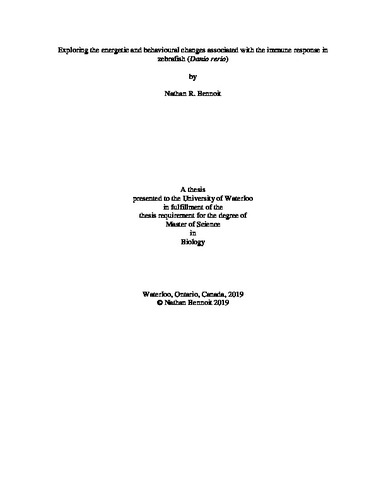| dc.description.abstract | With the world’s population continuously increasing, humanity constantly needs to figure out ways to increase food production to meet growing demands. One way to increase food production that has had exponential growth in recent years is aquaculture. This technique of cultivating fish has allowed society to meet protein needs; however, it has brought some challenges as well. One challenge is the management of disease that affects fish in aquaculture because of the high stocking densities and in some case interactions with an unfamiliar environment. The high prevalence of disease impacts the profits of the aquaculture industry due to mortality and reduced growth rates due to a reallocation of resources away from growth. To aid in understanding the energetic costs associated with disease in fish, this study aimed to quantify the energetic costs associated with the immune response in zebrafish (Danio rerio). The action of the immune response in zebrafish has been a target of many studies. However, the energetic demands and the behavioural changes involved in the immune response are poorly understood in any fish species. Zebrafish acclimated to 22°C and 27.5°C were either not injected or injected intraperitoneally with 10μl of saline, or heat-killed Vibrio anguillarum (1.21x10^10 cfu/ml). The fish were then placed into respirometry chambers and were acclimated for 3 hours prior to a 24-hour measurement period of their routine metabolic rate (RMR). Following the 24-hour measurement period, the zebrafish were euthanized, and their spleens were collected for RT-qPCR analysis of metabolic and immune related genes. Additionally, in order to examine the energetically costly behavioural responses to an immune challenge, zebrafish acclimated to 22°C were placed into a choice tank, where one side was 22.5°C and the other was 27.5°C and allowed to acclimate for 12 hours and then their movement was recorded for 12 hours. After the 12-hour recording period the zebrafish were injected with 10μl of saline or heat-killed V. anguillarum and
iv
placed back into the choice tank for 24 hours (12 hours to acclimate and 12 hours recorded). During the recording periods, temperature preference and the total distance travelled within the choice tank were measured. This study showed that zebrafish at 27.5°C and 22°C injected with heat-killed V. anguillaum had an elevated routine metabolic rate compared to fish that were not injected or injected with saline. At 27.5°C there was found to be a 29% increase in RMR and a 20% increase in RMR at 22°C. At 22°C there was found to be a significant increase in il-1b, il-10, il-8, tnfa, and ampka2 transcript abundance in the group injected with heat-killed V. anguillarum compared to the other two treatment groups. Analysis of the distance the zebrafish moved after injection with either saline or heat-killed V. anguillarum demonstrated that zebrafish movement did not change after the injection of heat-killed V. anguillarum. Overall, this study demonstrated that the energetic demands of zebrafish presented with an immune challenge increased. Understanding the metabolic and behavioural changes associated with an immune response will add to our understanding of care for infected fish in the aquaculture industry. | en |

